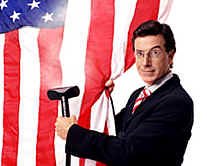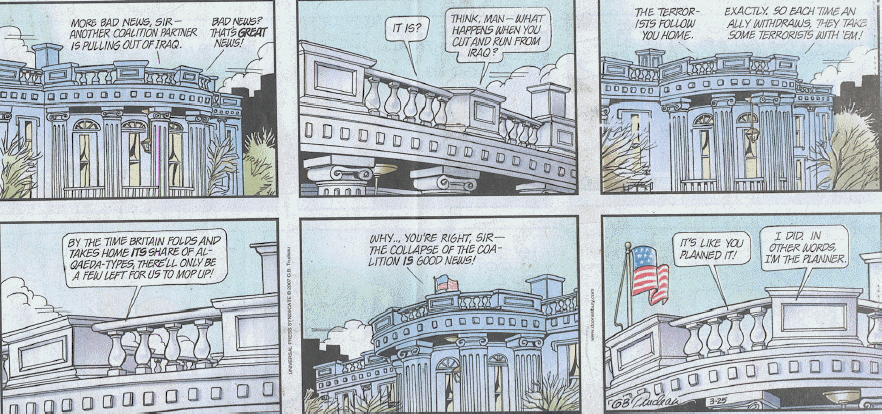Editor’s Note: Everyone supports your right to free speech, just as long as you’re really careful about whom you offend. Comic Bill Maher was fired from ABC for taking the name of his talk show, “Politically Incorrect,” literally. The Dixie Chicks thought there was freedom of speech in the good ol’ U.S. of A., until they actually tried using it. Unfortunately, they didn’t count on the cracker jingoism of country-and-western fans. In the same vein, if right-wing music critics like Sean Hannity ever hear Mary Chapin Carpenter’s new tune, “On With the Song,” they’ll be ranting about how un-American she is for daring to criticize the president and his war. Free speech is all a matter of whose ox you gore.
Danger: Heathens on the Internet
 |
Affecting the outrage that only an experienced performer like Bill O’Reilly can pull off with a straight face, the host of “The Factor” seemed to parody his own caricature, Stephen Colbert, as he excoriated two of John Edwards’ campaign workers for typing anti-Catholic messages into their blogs. Apparently, on the Right, it’s unacceptable to say anything unpleasant about Christianity. |
Conservative pundits often observe that liberals are willing to tolerate “Christian bashing,” but would never stand for similar things being said about blacks, homosexuals or Jews. There is some truth to this, but there’s also a good reason: the obvious differences between Christianity and the three groups typically cited by the Right.
Blacks, homosexuals and Jews never chose to be members of those groups. It was an accident of birth, and they couldn’t convert to something else, even if they wanted to. In contrast, Christians consciously select their affiliation. And, unlike blacks, homosexuals and Jews, their choice comes with reams of dogma — often controversial — that can open them up to criticism.
Religion may seem like something you’re born into, and, for many people, it does come down to an accident of geography. However, unlike race or sexual orientation, your church’s values and doctrines are something you can opt out of if you find them unpalatable.
Historically, Americans with even small amounts of black blood have been designated black, and there’s no escaping this classification. After centuries of slavery, lynchings and prejudice, America owes African-Americans some protection from racism. This isn’t political correctness: It’s simply being fair and decent to say that those who use ethnic stereotypes to degrade black people deserve to be called racist bigots (as Don Imus has discovered).
Although the nature/nurture debate on homosexuality is ongoing, I’ve never met a gay guy who considered his orientation an “option.” For example, I’ve never heard anyone say he woke up one morning and decided it would be fun to get beat up and be called a “faggot” during his high school years. Certainly, homosexuals can try to please their persecutors by becoming celibates, but they can’t escape who they are. And it isn’t political correctness to say that those who abuse them for a situation over which they’ve had no choice are homophobic bigots.
Anti-Semitism is another form of prejudice over which the victims have no control. The secular Jew who never sees the inside of a synagogue is still labeled a Jew by bigots, because anti-Semitism is less a form of religious prejudice than the scapegoating of an ethnic identity. In Nazi Germany, for example, Jews who claimed to have converted suffered the same fate as those who remained devout.
There’s a qualitative difference between practicing Judaism, the religion, and being a Jew: The former is a choice; the latter isn’t. And, given Christendom’s 2,000 years of pogroms and inquisitions, coupled with the recent piling on by Muslims worldwide, it isn’t political correctness to say that those who promote anti-Semitism are racist bigots.
The same analogy can be drawn regarding Muslims and Arabs. The practice of Islam is a choice, but no one can choose to be an Arab or elect to stop being one. Labeling Arabs with negative racial stereotypes is a form of anti-Semitic bigotry, whereas expressing disgust for the tenets of Islam or for the behaviors these beliefs produce is not.
Blacks, homosexuals and Semites (whether Arab or Israeli) lack a distinct, recognizable ethos. On the other hand, religions are, by definition, described almost entirely by their dogma. Hence, they’re more like political parties, which embrace ideologies that inform their activities.
Like Republicans and Democrats, Christians (as well as Muslims) are open to criticism from those who disagree with their philosophy. In an open society — where political opponents are encouraged to debate each other, often stridently — competing faiths, as well as those opposed to religion altogether, should have the same freedom.
In a democracy, you’d think citizens would have the right to say whatever they wanted to about religious dogmas and those who adhere to them, no matter how insulting or obnoxious their comments. However, the idea has taken hold on the Right that religion, especially Christianity, should be sacrosanct and, therefore, beyond critique.
Catholic League president William Donohue has made a career out of waiting around to be offended by someone who disagrees with some facet of Catholicism. Donohue’s goal seems to be to elevate the concept of “Catholic bashing” to a hate crime from which the church requires protection. Given the enormous wealth and power of the Catholic religion in this country, the idea that it’s being threatened by a couple of bloggers is too absurd to waste time discussing.
At the same time, Christianity’s revered and powerful position in American culture enables “people of faith” to attack everyone else, while expecting to be exempt from criticism. In this respect, they’re like the Jihadists in Iraq who shoot at American soldiers from inside mosques, assuming the infidels won’t insult Islam by firing back at them.
Evangelical Christians, the most-powerful sect in this country, assert everyone who isn’t a born-again Christian deserves and is scheduled for eternal torment in hell. As the fundamentalists constantly remind us, God considers the un-born-again unworthy — recall Rev. Bailey Smith, former head of the Southern Baptist Convention, who famously claimed that “God doesn’t hear the prayers of Jews.” God also considers non-Christian nations deserving of his wrath — recall Pat Robertson blaming 9/11 on feminists, homosexuals, liberals, and the separation of church and state. Isn’t this a form of reverse Christian bashing?
Should freedom of religion supersede the rest of the First Amendment? Should freedom of speech be limited when Christians might be offended? Should this freedom apply only to the rights of the devout to denigrate the heathen?
Hoping to keep her job, blogger Melissa McEwan claimed she never meant to “disparage people’s individual faith,” and her counterpart, Amanda Marcotte, said her intention was “never to offend anyone.” The accuracy of their rude and somewhat obscene commentaries on Christianity is debatable; however, their contention that they weren’t trying to insult anyone is ludicrous. But does this mean they should lose their jobs?
Right-wing radio and GOP-TV (Fox) considered it insufficient that John Edwards disavowed their remarks. Both Donohue and Bill O’Reilly repeatedly demanded that Edwards fire them, as if they’d committed a crime. Yet, many on the Right defend Anne Coulter’s calling Edwards a “faggot,” and social conservatives never chastise Donohue for his constant gay bashing and attacks on “secular Jews.”
If people like Donohue and Coulter have a First Amendment right to “shoot from inside the mosque” at homosexuals for things over which they have no control, then don’t the two bloggers have the right to attack Christians for the doctrines they’ve freely chosen? Of course, the Catholic League has the right to counterattack, but McEwan and Marcotte don’t deserve to lose their jobs for doing something as patriotically American as expressing an opinion.
 |
Prior to the invasion of Iraq, our president reportedly asked, “What’s the difference between Sunnis and Shi’ites? Aren’t the Iraqis Muslims?” This caused political comedian Bill Maher to call Mr. Bush “stupid,” for which O’Reilly labeled Maher “un-American” and “unpatriotic.” O’Reilly was — as usual — completely wrong. |
|
|
|
As distasteful as it is to compare the Rail Splitter and Great Emancipator to the Infinitive Splitter/Great Decider, no American president has ever been as viciously castigated as was Abraham Lincoln. Insulting our presidents is as American as apple pie. |
Mean-spirited abuse of our leaders is part of a healthy political discourse, and attacking someone’s religious beliefs (or lack thereof) is equally patriotic. (Just imagine what Karl Rove would be doing to Mormon Mitt Romney if he were competing in a primary against George W.) And this applies when the disparagement is rude, obnoxious or even stupid.
We Americans have the God-given right to be stupid. For centuries, U.S. soldiers have fought to protect such freedoms. In fact, it’s one of the reasons our servicemen are dying in Iraq right now … in more ways than one.

Click here to return to the Mark Drought home page.